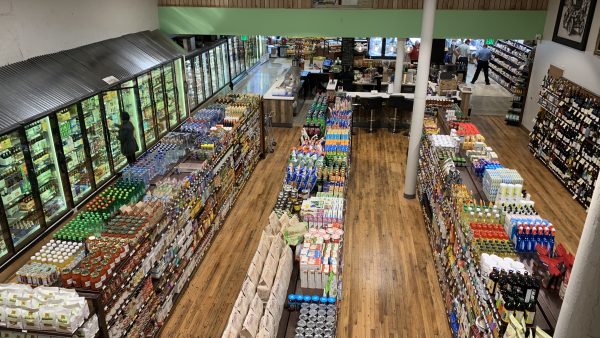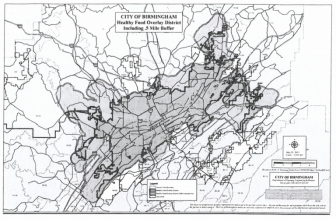Birmingham City Council Approves Healthy Food Overlay District
By Sam Prickett
The Birmingham City Council voted Tuesday to establish a “healthy food overlay district,” designed to make healthy food options more accessible for the approximately two-thirds of the city’s population that lives within food deserts.
The healthy food overlay district will cover areas of Birmingham defined by the U.S. Department of Agriculture as “low-access census tracts,” where “a significant number (at least 500 people) or share (at least 33%) of the population is greater than half a mile from the nearest supermarket, supercenter, or large grocery store.” The final version of the ordinance also establishes a half-mile “buffer” around the overlay district, within which restrictions on dollar stores will still apply.
The Healthy Foods Ordinance, first announced by Mayor Randall Woodfin in February, will limit the spread of dollar stores within that overlay district while loosening regulations on grocery stores, mobile grocers and farmers markets citywide.
The new law will prevent new “small box discount stores” — businesses such as Dollar General and Family Dollar — from opening within one mile of already extant small box discount stores.
Josh Carpenter, Woodfin’s director of innovation and economic development, told BirminghamWatch in April that this is because such stores “divert the customer base away from regular grocery stores or supermarkets or full-service grocery stores… Lots of research has demonstrated that dollar stores actually contribute to a loss of grocery stores over time.” According to Carpenter, five grocery stores in Jefferson County closed between 2005 and 2015.
Carpenter also said that the new restrictions might make Birmingham more enticing to potential new grocers. “We decided that curbing the growth of dollar stores might actually help us when we go out and recruit a full-service grocery store by saying, ‘Hey, you won’t have to worry about another dollar store coming in and eating into your customer base,’” he said. According to a report released in March by the Woodfin administration, three grocery store chains have declined invitations to expand into the city’s food deserts.
Other changes made by the Healthy Foods Ordinance to the overlay district include the loosening of parking and square-footage restrictions on grocery stores, as well as allowing community gardens to sell produce on-site.
The ordinance also provides for several citywide changes, including an increase of the number of days per year that farmers markets and market stands can operate. It also allows mobile grocers to operate in residential neighborhoods, so long as they are compliant with Jefferson County Department of Health regulations, are farther than 1,000 feet from brick-and-mortar grocers and do not operate for more than three consecutive days at the same location.
The council passed the ordinance 8-0; Councilor Steven Hoyt, who had been a vocal proponent, was absent.
The Healthy Food Ordinance follows — but is separate from — an ordinance passed in May allocating $500,000 toward incentives for new grocery stores.
Senate panel to vote on federal judge nomination for Emil Bove, who defended Trump
The vote comes as scores of former DOJ lawyers and retired state and federal court judges say they fear his intense loyalty to the president would carry over onto the bench.
A ‘Crypto Week’ win: Congress passes 1st major crypto legislation in the U.S.
It was a remarkable win for the crypto industry — and for President Trump, who campaigned on making the country "the crypto capital of the planet."
How did Condé Nast go from dominance to decline? A new book explains
For decades, Condé Nast publications such as Vogue and Vanity Fair were consequential tastemakers. Writer Michael Grynbaum explores the heyday of these magazines and how they lost their footing.
1960s pop star Connie Francis has died. The singer’s life was touched by tragedies
1960s pop star Connie Francis has died. The first female singer to chart a number-one single on the Billboard Hot 100, she sold over 40 million records before the age of 25.
Marc Maron on why it’s time for his ‘WTF’ podcast to end
Marc Maron is proud of his run as host of his podcast, WTF. And because of that, he's bringing it to a close. He wants to avoid it becoming just another show "feeding the garbage bin of content."
Virginia is for … data centers? Residents are increasingly saying no
The world's highest concentration of data centers is in Virginia. Many residents are not happy about that.










